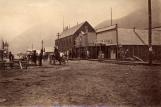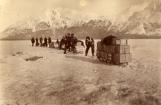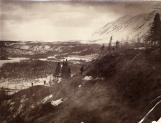14
Dyea is the last port before the climb of the Chilkoot Pass. A long wharf is built at the end of a tidal estuary.Most stampeders heading for the Klondike ended their sea travels here.
16
Goods taken from boats at Dyea were moved through the town by horse and cart. From Dyea these materials where then packed over the Chilkoot pass by hand or carried by train over the White Pass.17
Pyramid Harbour from the hill1898
Pyramid Harbor
 Credits:
Credits:(MacBride Museum Collection 1989.30.199)
18
Ships lying at anchor off Pyramid Harbour. This was a significant port in 1898. It was the entry point to the Chilkat Pass and the Dalton Trail as well as the site of a salmon cannery shipping fish to the south.20
Train and ship could only take you so far on your journey. From the coast, the only way to the goldfields was to walk, packing all your materials in the most efficient way you could imagine. Each stage of the journey needed materials and ingenuity to ease the load. Here goods are moved on sleds over the ice before the spring melt.22
For most of the journey in the creeks, you were simply walking up a lot of mountains carrying packs. Multiple trips were often required in order to bring in all the equipment and materials that were needed.23
From Pennock's Post to Shorty Creek, Lake Dezadeash22 May 1898
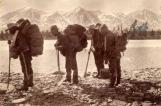 Credits:
Credits:(MacBride Museum Collection 1989.30.77)
24
First Nations Packers at Chilkat Pass1898
Chilkat Pass
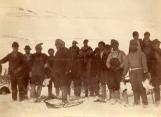 Credits:
Credits:(MacBride Museum Collection 1989.30.99)
25
Snowshoes were a big help for parts of the trip. Many adventurers brought them from the south and First Nations also made them from local materials.26
Grant Baldwin at Deadwood Camp19 April 1898
Deadwood Camp
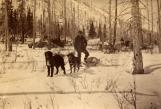 Credits:
Credits:(MacBride Museum Collection 1989.30.95)
